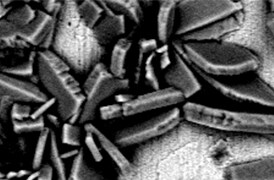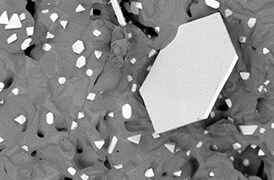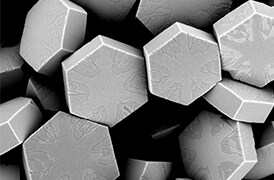Search

Materials Science
TEM Sample Preparation Techniques
FIB sample preparation for TEM analysis with DualBeam instruments.
Sample preparation for scanning/transmission electron microscopy (S/TEM) analysis is considered to be one of the most critical but challenging and time-consuming tasks in materials characterization labs. Conventional methods used to prepare ultra-thin samples required for S/TEM are slow, typically requiring many hours or even days of effort by highly trained personnel. This is further complicated by the variety of different materials and the need for site-specific information. For more than 30 years, Thermo Fisher Scientific has been continuously developing and optimizing sample preparation instruments and introducing software that enable in situ TEM sample preparation that allows researchers to accelerate their research and fast-track innovation.
Thermo Fisher Scientific has 30+ years of TEM sample preparation expertise. In 1993, we introduced DualBeam (FIB-SEM, focused ion beam – scanning electron microscopy) technology to give you cutting-edge sample preparation tools that are accessible, robust, and reliable. This begins with a highly stable column and high-quality source, which allows for excellent performance even at low voltages. Final polishing of the lamella using energies as low as 500 V greatly reduces damage, even to beam sensitive materials, and delivers unrivaled sample quality. For gallium-free sample preparation, Thermo Fisher Scientific has a broad portfolio of plasma FIB products, including the Thermo Scientific Helios Hydra DualBeam, which offers fast switching between four ion beam species; xenon, argon, oxygen, and nitrogen.
Additionally, Thermo Scientific SmartAlign Technology eliminates the need for any user alignments of the electron column, which not only minimizes maintenance, but also increases your productivity. Auto-tuning tools, embedded into the user interface, further increasing your ability to get high-quality images, tuning the image up to 10-times faster than standard manual alignment.
Quality hardware is supported by a suite of software solutions that enhance and simplify sample preparation. Thermo Scientific AutoTEM 5 Software enables fully automated in situ lamella preparation and lift-out, allowing even novice users to produce quality samples. This greatly expands the accessibility of the instrument, thereby increasing throughput as sample preparation is no longer reliant on expert operation. Moreover, full automation allows maximum utilization of system time with unattended overnight operation, resulting in greatly enhanced productivity.
TEM sample preparation is part of a multi-scale, multi-modal workflow that includes microCT, (P)FIB-SEM, and (S)TEM. First, data is acquired using the microCT, followed by data reconstruction and analysis using Thermo Scientific Avizo Software. Avizo Software visualizes the data and enables you to precisely locate the suitable regions of interest (ROI) for further exploration of the sample. When the ROI is identified, the workflow progresses through higher-resolution imaging and sample preparation with a plasma-focused ion beam (PFIB) DualBeam to atomic-scale analysis in a transmission electron microscope (TEM). When combined, these technologies provide a complete understanding of sample structure and composition, accelerating development of novel materials.
Automated S/TEM sample preparation in a multiscale workflow

Joseph Michael on how TEM sample preparation has progressed over the past 30 years
Joseph Richard Michael, who worked many years at Sandia National Laboratories in Materials, Physical and Chemical Sciences, tells his story of how TEM sample preparation changed the way he and his fellow materials scientists were able to do their research.
The Single-Beam and Dual-Beam Revolution: How FIB Instruments Transformed TEM Sample Preparation
In this podcast we hear David Foord, product director and materials scientist, in talks with some of his colleagues at Thermo Fisher Scientific. What started as a casual internal conversation around the driving force behind 30+ years of ion beam technology was so interesting that we wanted to share David’s story with you. This podcast proves that people at Thermo Fisher Scientific drive the field of materials science forward with solution-focused innovation that always circles around one question: What problem is this technology going to solve?
Nanoscale Materials Characterization
Understanding the nanoscale characteristics of materials is the first step in creating the next generation of lighter, stronger, and more energy efficient solutions. With our electron microscopy solutions, we help you simplify this complex material journey and accelerate your nanoscale materials research. Nanoscale workflow is a journey of material from bulk to nanometer scales using our DualBeam FIB-SEM for sample preparation and Transmission Electron Microscopes for material analysis.

Introducing Helios 5 DualBeam
Learn how advanced automation capabilities, increased robustness and stability enhancements in the Helios 5 and AutoTEM 5 software can significantly increase sample preparation throughout by allowing unattended and even overnight operation.

Toward “Damage-Free” TEM specimen preparation by Focused Ion Beam without Gallium
Diminish the challenges associated with focused ion beam (FIB) sample preparation for high resolution transmission electron microscopy (HR-TEM). Dr. Chengge Jiao, Staff Scientist of Applications Development at Thermo Fisher Scientific, explains how to tailor processing conditions and select the right FIB ion species for certain groups of materials to achieve optimized results.

Nano-, micro-, and mesoscale sample preparation by focused ion beam and laser milling
Listen to Dr. Joakim Reuteler, a FIB expert from ETH Zurich, discuss how gallium focused ion beam, multi-ion species plasma FIB, and ultra-short-pulse laser milling can help you prepare samples for a wide range of applications.

Introducing Helios 5 DualBeam
Learn how advanced automation capabilities, increased robustness and stability enhancements in the Helios 5 and AutoTEM 5 software can significantly increase sample preparation throughout by allowing unattended and even overnight operation.

Toward “Damage-Free” TEM specimen preparation by Focused Ion Beam without Gallium
Diminish the challenges associated with focused ion beam (FIB) sample preparation for high resolution transmission electron microscopy (HR-TEM). Dr. Chengge Jiao, Staff Scientist of Applications Development at Thermo Fisher Scientific, explains how to tailor processing conditions and select the right FIB ion species for certain groups of materials to achieve optimized results.

Nano-, micro-, and mesoscale sample preparation by focused ion beam and laser milling
Listen to Dr. Joakim Reuteler, a FIB expert from ETH Zurich, discuss how gallium focused ion beam, multi-ion species plasma FIB, and ultra-short-pulse laser milling can help you prepare samples for a wide range of applications.

Process control using electron microscopy
Modern industry demands high throughput with superior quality, a balance that is maintained through robust process control. SEM and TEM tools with dedicated automation software provide rapid, multi-scale information for process monitoring and improvement.

Quality control and failure analysis
Quality control and assurance are essential in modern industry. We offer a range of EM and spectroscopy tools for multi-scale and multi-modal analysis of defects, allowing you to make reliable and informed decisions for process control and improvement.

Fundamental Materials Research
Novel materials are investigated at increasingly smaller scales for maximum control of their physical and chemical properties. Electron microscopy provides researchers with key insight into a wide variety of material characteristics at the micro- to nano-scale.

Battery Research
Battery development is enabled by multi-scale analysis with microCT, SEM and TEM, Raman spectroscopy, XPS, and digital 3D visualization and analysis. Learn how this approach provides the structural and chemical information needed to build better batteries.

Polymers Research
Polymer microstructure dictates the material’s bulk characteristics and performance. Electron microscopy enables comprehensive microscale analysis of polymer morphology and composition for R&D and quality control applications.

Metals Research and Characterization
Effective production of metals requires precise control of inclusions and precipitates. Our automated tools can perform a variety of tasks critical for metal analysis including; nanoparticle counting, EDS chemical analysis and TEM sample preparation.

Catalysis Research
Catalysts are critical for a majority of modern industrial processes. Their efficiency depends on the microscopic composition and morphology of the catalytic particles; EM with EDS is ideally suited for studying these properties.
Electron microscopy services for
the materials science
To ensure optimal system performance, we provide you access to a world-class network of field service experts, technical support, and certified spare parts.















